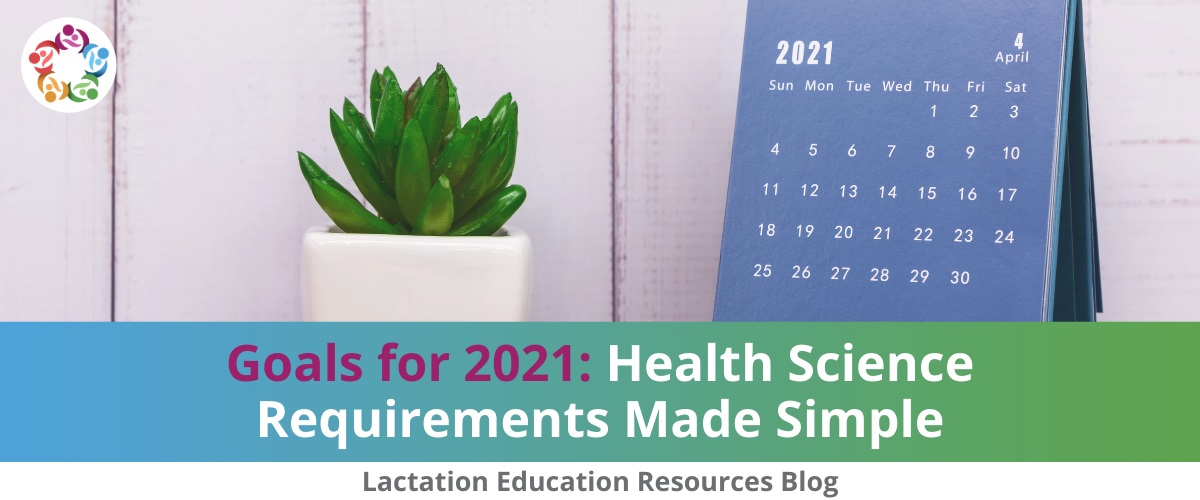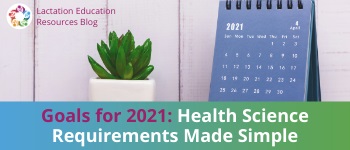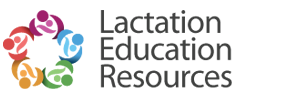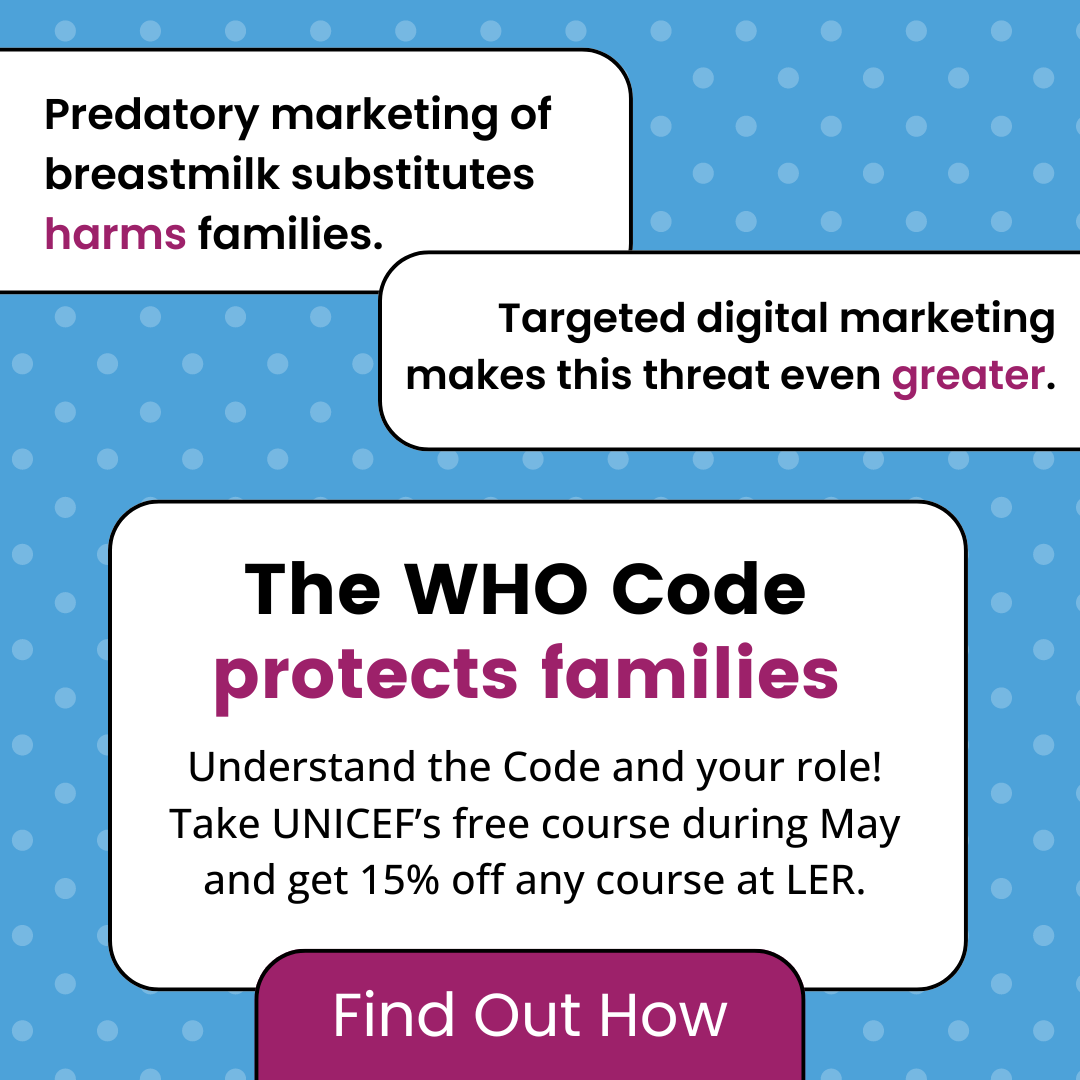Goals for 2021: Health Science Requirements Made Simple

Depending on your educational background, the 14 health science courses required to apply to take the IBCLC exam can be an item you quickly cross off your list … or the one thing standing in your way.
If getting the necessary coursework is on your list of goals, 2021 could be an excellent year to check some of those boxes.
In this blog series, Goals For 2021, we bring you the insider perspective of Angela Love-Zaranka, BA, IBCLC, RLC, Program Director at Lactation Education Resources (LER).
Love-Zaranka served on the IBLCE Board from 2006 to 2012 and sat on IBLCE committees until 2015.
In this post, Love-Zaranka discusses ways to fulfill the health sciences education requirements.
Let’s talk about what classes are required, how to get them, and what to do if this is going to take you a while.
What do I have to do?
The Health Science Education Requirements fall into two categories.
Let’s talk about the college courses first.
There are eight courses you must take from an accredited college or university.
You must obtain a passing grade (or a “pass” in a pass/fail class), and the course must be at least one academic session in length (defined by IBLCE as 25 or more hours).
Ready for the subject areas? Here they are:
- Biology
- Human Anatomy
- Human Physiology
- Infant and Child Growth and Development
- Introduction to Clinical Research
- Nutrition
- Psychology or Counseling Skills and Communication Skills
- Sociology or Cultural Sensitivity or Cultural Anthropology
There are six more courses, which you will not find at a university, but need to complete.
- Basic Life Support
- Medical Documentation
- Medical Terminology
- Occupational Safety and Security for Health Professionals
- Professional Ethics for Health Professionals
- Universal Safety Precautions and Infection Control
The first eight courses can be taken at a college or university, online, or in your community. The second six courses can be taken as continuing education courses. (LER offers a course here that combines five out of the six here, just leaving you to find a local Basic Life Support class.
It’s important to remember that all of these courses need to be completed before you apply for the exam—not by the exam date itself.
Why do I have to do it? Are your clients really going to ask you the function of an alveoli, or quiz you on research methods?
Probably not.
So why are college courses in topics like anatomy and research required for the IBCLC exam?
Love-Zaranka, who was on the committee when IBLCE set the college health science requirements, explains it like this: “It has to do with playing in the same sandbox. Health care professionals have common subjects they study during their training. The language and terminology is different from the language utilized when speaking to parents. If you want to talk to a physician, it’s helpful if you know what ‘hyperbilirubinemia’ means.”
Not to mention, the knowledge you gain can come in handy during the exam. “For example, if you know your Latin derivatives, you may be able to figure out a term on the exam that you’ve never heard before!” Love-Zaranka notes.
"I know many people experience these requirements as a barrier to entry to the field. The requirements weren't intended that way,” she adds. “They are designed to make sure you are fully prepared to be an allied healthcare professional--a valued member of the team.”
Do my previous classes count?
The short answer is, probably yes!
If you have already earned some college credits, start by looking over your transcript. It’s possible that courses you’ve already taken fulfill some—or all—of the requirements.
Courses have different titles and vary slightly in content, but many classes people take as undergraduates do count.
“Don’t stress about it!” says Love-Zaranka. “If the name of what you took matches the Health Science Education Guide (linked below) they won't look much further. If the course titles don't match the IBLCE Health Science Guide, make sure to compare the course descriptions and choose a course that matches one of their descriptions.”
Looking for more details? Click on this link. Then click on a specific subject, and IBLCE has provided the titles of typical courses that meet each requirement. We also discuss this in our free recorded session, Real Talk: The Realities of Being and Becoming an IBCLC.
Where should I take my missing classes?
First, Love-Zaranka says, think about the setting that will work best for you. Do online classes work for you? Or would you learn better in person?
“What kind of learner are you?” Love-Zaranka asks. “If you’re an older student, are you going to enjoy being back in the classroom with younger people? Or would you prefer to learn online?”
How will I afford it?
Paying for classes can be expensive. Fortunately, there are options.
LER partners with Global Health and Walden University to offer access to college courses online. For those who opt to complete a full degree program, financial aid may be an option. For those who opt to take the IBLCE requirements only, choosing our partner programs may help you avoid costly or time-consuming prerequisites to the needed classes.
However, other affordable options do exist. Your local community college is one option.
Or, check out MOOC.org. This searchable website connects you with free or low-cost online college courses, and many of the subjects required for the IBCLC exam can be found here.
The courses are offered by various accredited colleges and universities. By paying a small fee (often $50 to $100) and taking the class, you obtain a certificate of completion that fulfills your requirement. “It’s cheaper than community college,” Love-Zaranka notes.
How can I fit it in?
If your life is already full, enrolling in a college course can feel daunting.
Setting realistic goals is key. “Knowing what you have time for is the first step,” Love-Zaranka says. “Get out your planner and figure out how many hours in your week you can spend on coursework.”
Expect the unexpected and allow for extra family needs, illness, and other contingencies. Only commit to as many courses at a time as you can comfortably do.
This will take forever!
What if you need a few courses … or more than a few? What if you need all of them?
Don’t give up.
“Break down what you need to do and plan it out,” Love-Zaranka says. “And then, continue to feed your passion in the meantime. Hold open that space in your mind and in your heart.”
Can you check in with your local WIC and see if you can volunteer? Or find another option for connecting with and helping lactating families in your area?
“If that gets discouraging because you can’t find an opportunity, pivot and go online,” Love-Zaranka urges. “Find an online mentor—many people are willing to do more online mentoring now because of Covid-19.
“Any time you hit a wall,” she says, “go back and find a place where the path is a little clearer. Then, keep going.”
Useful Links:
Find a summary of the requirements from IBLCE here.
Get a detailed description from IBLCE here
For a big-picture look at planning your path to the IBCLC exam, see the first post in this series Planning your path to the IBCLC.

Depending on your educational background, the 14 health science courses required to apply to take the IBCLC exam can be an item you quickly cross off your list … or the one thing standing in your way.
If getting the necessary coursework is on your list of goals, 2021 could be an excellent year to check some of those boxes.
In this blog series, Goals For 2021, we bring you the insider perspective of Angela Love-Zaranka, BA, IBCLC, RLC, Program Director at Lactation Education Resources (LER).
Love-Zaranka served on the IBLCE Board from 2006 to 2012 and sat on IBLCE committees until 2015.
In this post, Love-Zaranka discusses ways to fulfill the health sciences education requirements.
Let’s talk about what classes are required, how to get them, and what to do if this is going to take you a while.
What do I have to do?
The Health Science Education Requirements fall into two categories.
Let’s talk about the college courses first.
There are eight courses you must take from an accredited college or university.
You must obtain a passing grade (or a “pass” in a pass/fail class), and the course must be at least one academic session in length (defined by IBLCE as 25 or more hours).
Ready for the subject areas? Here they are:
- Biology
- Human Anatomy
- Human Physiology
- Infant and Child Growth and Development
- Introduction to Clinical Research
- Nutrition
- Psychology or Counseling Skills and Communication Skills
- Sociology or Cultural Sensitivity or Cultural Anthropology
There are six more courses, which you will not find at a university, but need to complete.
- Basic Life Support
- Medical Documentation
- Medical Terminology
- Occupational Safety and Security for Health Professionals
- Professional Ethics for Health Professionals
- Universal Safety Precautions and Infection Control
The first eight courses can be taken at a college or university, online, or in your community. The second six courses can be taken as continuing education courses. (LER offers a course here that combines five out of the six here, just leaving you to find a local Basic Life Support class.
It’s important to remember that all of these courses need to be completed before you apply for the exam—not by the exam date itself.
Why do I have to do it? Are your clients really going to ask you the function of an alveoli, or quiz you on research methods?
Probably not.
So why are college courses in topics like anatomy and research required for the IBCLC exam?
Love-Zaranka, who was on the committee when IBLCE set the college health science requirements, explains it like this: “It has to do with playing in the same sandbox. Health care professionals have common subjects they study during their training. The language and terminology is different from the language utilized when speaking to parents. If you want to talk to a physician, it’s helpful if you know what ‘hyperbilirubinemia’ means.”
Not to mention, the knowledge you gain can come in handy during the exam. “For example, if you know your Latin derivatives, you may be able to figure out a term on the exam that you’ve never heard before!” Love-Zaranka notes.
"I know many people experience these requirements as a barrier to entry to the field. The requirements weren't intended that way,” she adds. “They are designed to make sure you are fully prepared to be an allied healthcare professional--a valued member of the team.”
Do my previous classes count?
The short answer is, probably yes!
If you have already earned some college credits, start by looking over your transcript. It’s possible that courses you’ve already taken fulfill some—or all—of the requirements.
Courses have different titles and vary slightly in content, but many classes people take as undergraduates do count.
“Don’t stress about it!” says Love-Zaranka. “If the name of what you took matches the Health Science Education Guide (linked below) they won't look much further. If the course titles don't match the IBLCE Health Science Guide, make sure to compare the course descriptions and choose a course that matches one of their descriptions.”
Looking for more details? Click on this link. Then click on a specific subject, and IBLCE has provided the titles of typical courses that meet each requirement. We also discuss this in our free recorded session, Real Talk: The Realities of Being and Becoming an IBCLC.
Where should I take my missing classes?
First, Love-Zaranka says, think about the setting that will work best for you. Do online classes work for you? Or would you learn better in person?
“What kind of learner are you?” Love-Zaranka asks. “If you’re an older student, are you going to enjoy being back in the classroom with younger people? Or would you prefer to learn online?”
How will I afford it?
Paying for classes can be expensive. Fortunately, there are options.
LER partners with Global Health and Walden University to offer access to college courses online. For those who opt to complete a full degree program, financial aid may be an option. For those who opt to take the IBLCE requirements only, choosing our partner programs may help you avoid costly or time-consuming prerequisites to the needed classes.
However, other affordable options do exist. Your local community college is one option.
Or, check out MOOC.org. This searchable website connects you with free or low-cost online college courses, and many of the subjects required for the IBCLC exam can be found here.
The courses are offered by various accredited colleges and universities. By paying a small fee (often $50 to $100) and taking the class, you obtain a certificate of completion that fulfills your requirement. “It’s cheaper than community college,” Love-Zaranka notes.
How can I fit it in?
If your life is already full, enrolling in a college course can feel daunting.
Setting realistic goals is key. “Knowing what you have time for is the first step,” Love-Zaranka says. “Get out your planner and figure out how many hours in your week you can spend on coursework.”
Expect the unexpected and allow for extra family needs, illness, and other contingencies. Only commit to as many courses at a time as you can comfortably do.
This will take forever!
What if you need a few courses … or more than a few? What if you need all of them?
Don’t give up.
“Break down what you need to do and plan it out,” Love-Zaranka says. “And then, continue to feed your passion in the meantime. Hold open that space in your mind and in your heart.”
Can you check in with your local WIC and see if you can volunteer? Or find another option for connecting with and helping lactating families in your area?
“If that gets discouraging because you can’t find an opportunity, pivot and go online,” Love-Zaranka urges. “Find an online mentor—many people are willing to do more online mentoring now because of Covid-19.
“Any time you hit a wall,” she says, “go back and find a place where the path is a little clearer. Then, keep going.”
Useful Links:
Find a summary of the requirements from IBLCE here.
Get a detailed description from IBLCE here
For a big-picture look at planning your path to the IBCLC exam, see the first post in this series Planning your path to the IBCLC.
By accepting you will be accessing a service provided by a third-party external to https://www.lactationtraining.com/

